Lesson-8 My Teacher 3PPT课件
合集下载
期末总复习课件(共47张PPT) 人教版英语八年级上册.ppt

例如:He likes apples.他喜欢苹果。 ( 主语是He, likes 是动词第三人称单数形式)
一般现在时的关键词:always,(总是),often(经常), usually (通常), never从未;every day每天, every week每周, every year每年, sometimes有时候, at times时常。
A.as better as B.as good as √C.as well as
( )8.The programs on Channel 10 are ____better than Channel 5.
A.more
√B.much
C.many
( )9.He is _____than any other students in his class.
A.cold B√.colder
C.coldest
( )14.Which city is______,Bei jing,Shang hai or Liuzhou?A.bigB.bigger
√C.the biggest
模块5和6:动词不定式 (1)、(2)和双宾语。 1.动词不定式(带to的动词):to+动词原形(注:to do代表不定式) 例如:She wants to see her aunt.她想去看望她的阿姨。
( )4.I______ my homework when my mother came home.
A.am doing √B.was doing C.did ( )5.She often ______ shopping with her mother.
A√.goes B.go C.went ( )6.We_____swimming tomorrow afternoon.
一般现在时的关键词:always,(总是),often(经常), usually (通常), never从未;every day每天, every week每周, every year每年, sometimes有时候, at times时常。
A.as better as B.as good as √C.as well as
( )8.The programs on Channel 10 are ____better than Channel 5.
A.more
√B.much
C.many
( )9.He is _____than any other students in his class.
A.cold B√.colder
C.coldest
( )14.Which city is______,Bei jing,Shang hai or Liuzhou?A.bigB.bigger
√C.the biggest
模块5和6:动词不定式 (1)、(2)和双宾语。 1.动词不定式(带to的动词):to+动词原形(注:to do代表不定式) 例如:She wants to see her aunt.她想去看望她的阿姨。
( )4.I______ my homework when my mother came home.
A.am doing √B.was doing C.did ( )5.She often ______ shopping with her mother.
A√.goes B.go C.went ( )6.We_____swimming tomorrow afternoon.
Unit 3复习课件2021-2022学年人教版八年级英语上册

__________ __________ and have fun.
Section A A5 Language points
tall late heavy big carefully
good/well→
→
bad/badly →
→
many/much→ →
little → →
few → →
Section B
--- It’s our dream to have less and less pollution in our city.
--- I think _______ our citizens and the government should do
something for it.
A. both B. all
① We beat them. 我们打败了他们。
②be---a--t-ACllatnheyotu①②eagm打击use败打sas。。rew后指sht接连ircoh表续ntg示击e.a人打Imt’/。团ws iwr队lel ia_的n_ll_y名__h词_a_r。_d_②_tot雨hTshe击aemy打.raL着tiencth窗’bte户soawm。taoaigtrraaoinwnds?tsteheetwheindow.
shorter
more
clearly
Nelly.
Anna: Yes, but Nelly danced better than Lisa. really
Julie: You can tell that Lisa __________ wanted to win, though.
something
Anna: Well, everyone wants to win, But the most important thing is to learn new
科普版三年级下册第八课PPT
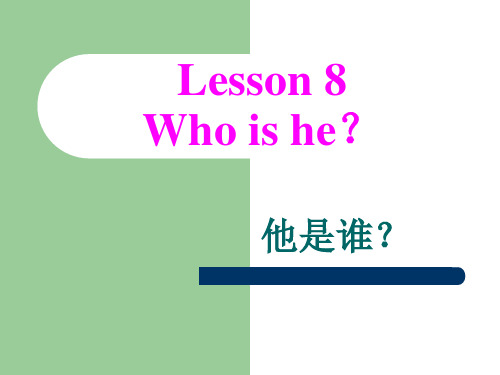
你好,汤姆!他是谁?
He’s my little brother.
他是我的小弟弟。
Hi, what’s your name? My name is pete. How old are you? I’m three.
father mother teacher brother sister
Who is he/she? He/She is my______.
she [ʃ iː] 她
Pete [piːt] 皮特
me [m iː]
我
Eve [iːv] 伊芙
Homework
1.抄写第八课单词,每个两行,家长报听写。 2.完成小天才第八课。 3.朗读第八课单词课文十遍,背诵第八课课文
,默写第八课课文。每天听半小时磁带。 4.家长签字。
Let’s chant
Who is the boy?
Who is he? He’s my
brother Pete. He looks like
这个男孩是谁? 他是谁? 他是我的弟弟皮
特。 他看上去像我。 我喜欢他。 他也喜欢我。
he [hiː] 他
we [w iː] 我们
[iː]
老师 She is my teacher.
three [θri:] 三
three dolls I’m three.
look like 看上去像
She looks like you.
Can you read?
[bɔɪ] [hiː] ['brʌðə]he
他
brother 兄弟
Lesson 8 Who is he?
他是谁?
he
[hiː]
他
boy
[bɔɪ]
He’s my little brother.
他是我的小弟弟。
Hi, what’s your name? My name is pete. How old are you? I’m three.
father mother teacher brother sister
Who is he/she? He/She is my______.
she [ʃ iː] 她
Pete [piːt] 皮特
me [m iː]
我
Eve [iːv] 伊芙
Homework
1.抄写第八课单词,每个两行,家长报听写。 2.完成小天才第八课。 3.朗读第八课单词课文十遍,背诵第八课课文
,默写第八课课文。每天听半小时磁带。 4.家长签字。
Let’s chant
Who is the boy?
Who is he? He’s my
brother Pete. He looks like
这个男孩是谁? 他是谁? 他是我的弟弟皮
特。 他看上去像我。 我喜欢他。 他也喜欢我。
he [hiː] 他
we [w iː] 我们
[iː]
老师 She is my teacher.
three [θri:] 三
three dolls I’m three.
look like 看上去像
She looks like you.
Can you read?
[bɔɪ] [hiː] ['brʌðə]he
他
brother 兄弟
Lesson 8 Who is he?
他是谁?
he
[hiː]
他
boy
[bɔɪ]
新冀教版八年级英语上全册优质教学课件(匹配所有课时)

Li Ming: That’s exciting!You always like to make new friends. Where are Sandra and Mary from? Danny: I don’t know. I wanted to talk to Sandra but I didn’t know how to begin. Li Ming: Well, you can introduce yourself to her. You can also ask her questions.
about your first day back to school. one…and the other… make friends introduce…to… the same as look for
Words & phrase
Sandra Cox physics recent
n. 桑德拉
n. 考克斯 n. 物理学 adj. 最近的;近代的
1. I was happy to see my classmates after such a long holiday. 这么长的假期过后,看到同学们我很高兴。 (1) be + adj(happy/sorry/glad)to do sth 意思是“做某事很……” • I am sorry to hear that. 听到那件事很抱歉。 (2) such + a/an + 名词 such 作形容词,意为“如此,这么”,一般修饰名词 . • I never saw such a bird. 我不曾看过这样的鸟。 • It was such a cold day that I wore two sweaters. 天气 这么冷,我穿了两件毛衣。
新概念英语第一册lesson 7-8

What is Rober's job?
ROBERT:
I am a new student.
My name's Robert.
SOPHIE:
Nice to meet you.
My name's Se you French?
SOPHIE:
Yes, I am.
Are you French, too?
housewife [5haJswaIf] n. 家庭妇女
复数: housewives
milkman [5mIlkmEn] n. 送牛奶的人
复数 milkmen
Lesson 8 What's your job?
[词汇](10)
policeman [pE5li:smEn]
n. 警察
policewoman [pE`li:s9wJmEn] n.女警察
taxi driver [5tAksi-5draivE] n. 出租车司机
air hostess [ZE-5hEustEs]
n. 空中小姐
postman [5pEJstmEn]
n. 邮递员
nurse
[n\:s]
n. 护士
mechanic [mi5kAnik]
n. 机械师
hairdresser [5heEdresE]
/ `DpəreItə/
/ 5endVI5nIE/
v. be动词现在时第一人称单 数
v. be动词现在时复数
n.名字 a.& pron.什么 n.国籍 n.工作 n.电脑键盘 n.操作人员 n.工程师
闪亮登场
1234. MIMNayiycmnenaatmomneme'w'.t.
冀教版英语八年级上册_Lesson8_优教精品课件

3. But I saw him smile.
see sb. do sth. 看见某人干了某事(结果) see sb. soing sth.看见某人正在干某事(过程) 例:I saw an old man _g_e_t__ on the bus. 我看见一位老人上了公共汽车。 The policeman saw a few men _s_te_a_l_in_g__ a car. 警察们看见几个人正在偷一辆汽车。
except
表示“除……之外”,不包括except之后的 内容,其后可接名词、代词。
besides
意思是“除……之外(尚有)……”,包 括besides之后的内容。
例: We all crossed the river _e_x_c_e_p_t Tom. 除了汤姆,我们都过了河。 He also knows Japanese _b_e_s_id_e_s_ English. 除了懂英语之外,他也懂日语。
Read the lesson and write true (T) or false (F).
1. Danny’s favourite subject is P.E.
( T)
2. The teacher was very angry with Danny. ( F )
3. Li Ming’s favourite subject is English. ( T )
Example: English: I like English best. I write e-mails in English every week. Maths:__________________________________ Chinese:_________________________________
新概念一册Lesson7-8Are you a teacher课件
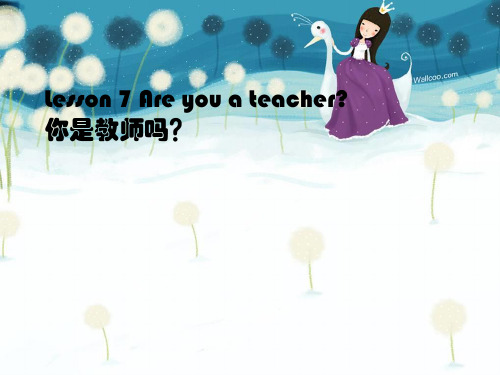
What is Robert’s job?
Language points:
1.人称代词 主格 I 我 you 你,你们 she 她 he 他 it 它 they 他们 we 我们 宾格 me我 you 你,你们 her(她) him(他) it 它 them他们 us 我们
I(我)用am,你(you) 用are,is连着she(她),he(他),it(它) 单数用is,复数全用are. I + am You/they/we + are She/he/it+ is 2.My name’s Robert. 我的名字叫罗伯特。 My name’s …=My name is … 我的名字叫… What’s your name?你叫什么名字。 My name’s +名字=My name is +名字 I am +名字 =I’m +名字 名字
ห้องสมุดไป่ตู้
补充内容
国籍
German French Japanese Korean Chinese Swedish American English Italian
国家
Germany France Japan Korea China Sweden America England Italy
练习: 1.What nationality are you? German I am German. 2.Where are you from? ( English England) I am English. I’m from England. your job?(用you的适当形式填空) 3.What’s _______ I am a taxi-driver. 4.Nice to meet you. (同义句) Glad to meet you. Nice to see you.
冀教版八年级英语上册 Unit 1 Lesson 3 课件(共16张PPT)

• bed early.
Homework
• 1 Read the passage carefully again. • 2 Ask your family and friends about their
interests,write down the answers.Be ready to show it to the class the next day.
• Danny loves to eat donuts
• Sandra play the violin \ go for walks
• Sandra likes to play the violin
Like\love\enjoy\be interested in doing
• We eat different foods
Finish these exercises
• (1)The little girl began to play C violin at the age of five. • A a B an C The D \ • (2 )David doesn’t like rice--flour oodles.His son doesn’t, C . • A Also B too C Either D Not • (3) They missed the train, so they had to wait for A hours. • A two more B more two C Two another D Other two • (4) If you D your name on the paper,you can get a magazine. • A cut down B look down C Turn down D write down • (5) Excuse me , may I ask you a question? • Sure, A. • A go ahead B you’d better not C I hope so
新概念英语第一册1-8课PPT课件
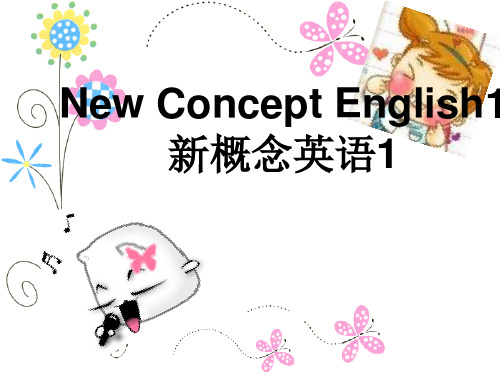
• [b] [k] [s] [d] [f] [ ][g] [ ][h] [l] [m] [n] [p] [r] [z] [t] [v] [w] [j] [ ][ ][θ] [ ][tr] [dr] [ts] [dz] [З]
the 是定冠词表示特指 Look,look,a man is coming into the classroom. The man is our teacher. 3.and “也 ”用于肯定句中 My father and mother are very kind. also “也” 用于肯定句中 She is a teacher.I am also a teacher. too “也”,用于肯定句末 He likes playing computer games too. either “也”,用于否定句末 I don’t like eggplant either. but “但是”,表转折 They are rich.But I am poor. 4.初次见面还可以说 -How do you do? -How do you do?
9.Thank you very/somuch.=Thanks a lot. 非常感谢! You're welcome. It's my pleasure. Don't mention it.
10.this这个 that那个 these这些 those那些
Lesson 3 Sorry,Sir.
1.here这里 there那里 home 家 aboard国外 upstairs楼上 downstairs楼下 downtown市中心
地点副词前面不能用介词 eg. go home
2.My umbrella and my coat,please.省略 了动词和间接宾语(give me)的祈使句。 由一个动词原形开头的句子就是祈使句。 Let's go out and play.
the 是定冠词表示特指 Look,look,a man is coming into the classroom. The man is our teacher. 3.and “也 ”用于肯定句中 My father and mother are very kind. also “也” 用于肯定句中 She is a teacher.I am also a teacher. too “也”,用于肯定句末 He likes playing computer games too. either “也”,用于否定句末 I don’t like eggplant either. but “但是”,表转折 They are rich.But I am poor. 4.初次见面还可以说 -How do you do? -How do you do?
9.Thank you very/somuch.=Thanks a lot. 非常感谢! You're welcome. It's my pleasure. Don't mention it.
10.this这个 that那个 these这些 those那些
Lesson 3 Sorry,Sir.
1.here这里 there那里 home 家 aboard国外 upstairs楼上 downstairs楼下 downtown市中心
地点副词前面不能用介词 eg. go home
2.My umbrella and my coat,please.省略 了动词和间接宾语(give me)的祈使句。 由一个动词原形开头的句子就是祈使句。 Let's go out and play.
新概念英语二 第8课课件

② vt.&vi. 参加,加入 We’ve entered into an agreement. 我们已达成一项协议。 He soon entered their conversation.
each和every均可译为“每一个”,二者常常可 以互相代替使用: Every/ Each time I wash the car it rains. 每次我擦洗汽车,天总是下雨。
在句末。如:
He went there too. He didn't go there either. I like you as well. I also went there.
also,too,as well与either 的区别
also,as well,too,用于肯定句,also常用 于be动词,情态动词,助动词之后,行为动 词之前;as well,too用于句末;either用于 否定句中,置于句末。 例如: My father is a teacher. My mother is also a teacher. =My father is a teacher. My mother is a teacher as well. =My father is a teacher. My mother is a teacher,too. 我爸爸是一名老师,我妈妈也是。
❖2. neat 整洁的, 整齐的(适合用于 赞赏女孩子的房间)
❖ e.g. What a neat room!
❖What a mess !
❖ e.g. a neat cupboard/ room/ house/
❖ e.g. she is a neat dresser/ worker. 未掺水的
❖ e.g. a neat whisky/ Brandy/ vodka/
each和every均可译为“每一个”,二者常常可 以互相代替使用: Every/ Each time I wash the car it rains. 每次我擦洗汽车,天总是下雨。
在句末。如:
He went there too. He didn't go there either. I like you as well. I also went there.
also,too,as well与either 的区别
also,as well,too,用于肯定句,also常用 于be动词,情态动词,助动词之后,行为动 词之前;as well,too用于句末;either用于 否定句中,置于句末。 例如: My father is a teacher. My mother is also a teacher. =My father is a teacher. My mother is a teacher as well. =My father is a teacher. My mother is a teacher,too. 我爸爸是一名老师,我妈妈也是。
❖2. neat 整洁的, 整齐的(适合用于 赞赏女孩子的房间)
❖ e.g. What a neat room!
❖What a mess !
❖ e.g. a neat cupboard/ room/ house/
❖ e.g. she is a neat dresser/ worker. 未掺水的
❖ e.g. a neat whisky/ Brandy/ vodka/
Unit 7 Art Lesson 3 教学课件-高中英语北师大版必修第三册
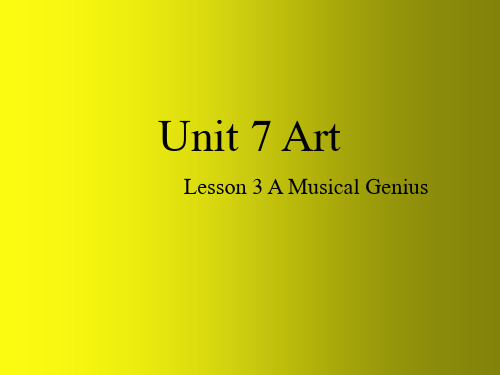
练习:I ____r_e_s_p_o_n__d___ to the news by bursting into
tears.
3. hesitate
hesitate about/ over/ at (doing)… 对(做)……感到犹豫 hesitate to do sth. 迟疑做某事,不愿做某事 hesitation n. 犹豫 without hesitation 毫不犹豫 have no hesitation in doing sth. 毫不犹豫地做某事
练习:We have to make a small ___c_h_a_r_g_e___ for
refreshments.
5. signal
signal (to) sb. to do sth. 示意某人做某事 signal to sb. 向某人示意 danger/ warning signal 危险/ 警告信号 traffic signals 交通信号 a stop signal 停车信号
a 3 What big challenge did Beethoven face?
a He became deaf.
b He became blind.
c He was unable to walk.
a 4 How many pieces of music did Beethoven write?
Complete the sentences with the phrases below.
1 Before the performance, the _b_a_c_k_s_t_a_g_e__a_tm__o_s_p_h_e__re_ was tense.
2 Michael Umlauf joined him and together the two men
tears.
3. hesitate
hesitate about/ over/ at (doing)… 对(做)……感到犹豫 hesitate to do sth. 迟疑做某事,不愿做某事 hesitation n. 犹豫 without hesitation 毫不犹豫 have no hesitation in doing sth. 毫不犹豫地做某事
练习:We have to make a small ___c_h_a_r_g_e___ for
refreshments.
5. signal
signal (to) sb. to do sth. 示意某人做某事 signal to sb. 向某人示意 danger/ warning signal 危险/ 警告信号 traffic signals 交通信号 a stop signal 停车信号
a 3 What big challenge did Beethoven face?
a He became deaf.
b He became blind.
c He was unable to walk.
a 4 How many pieces of music did Beethoven write?
Complete the sentences with the phrases below.
1 Before the performance, the _b_a_c_k_s_t_a_g_e__a_tm__o_s_p_h_e__re_ was tense.
2 Michael Umlauf joined him and together the two men
五年级上册英语课件Lesson 8 Canada|冀教版(三起) (共22张PPT)

问句: What do you know about + 其他? 你了解有关……的什么?
答句: I know + 其他 . 我知道……。
讲解
例句: —What do you know about our teacher ? 你了解有关我们老师的什么吗?
—I know she is 25 years old. 我知道她 25 岁。
Unit 2 My Country and English-speaking Countries
111111111111111111111111111111111111111111111111111111111111111111111111111111
111111111111111111111111J1J111五11年11级111上11册11111111111111111111111111
习题
二、 魔法变变变。变化一个或两个字母,变一个新单词。 (1) pity — ___ci_t_y__ (2) know — __s_n_o_w___ (3) Canada — _b_a_n_a_n__a_ (4) above — _a_b__o_u_t_
本节课我们学习了以下知识,请同学们一定加 强巩固,以便能和同学们进行灵活交流哦! 重点词汇:Canada know about city leaf 重点句式:—What do you know about Canada, Li Ming?
典例 What do you know __B___ China?
A. to
B. about
C. on
讲解
知识点 5 city /sɪti/ n. 城市
例句: I come from a beautiful city. 我来自一个美丽的城市。
答句: I know + 其他 . 我知道……。
讲解
例句: —What do you know about our teacher ? 你了解有关我们老师的什么吗?
—I know she is 25 years old. 我知道她 25 岁。
Unit 2 My Country and English-speaking Countries
111111111111111111111111111111111111111111111111111111111111111111111111111111
111111111111111111111111J1J111五11年11级111上11册11111111111111111111111111
习题
二、 魔法变变变。变化一个或两个字母,变一个新单词。 (1) pity — ___ci_t_y__ (2) know — __s_n_o_w___ (3) Canada — _b_a_n_a_n__a_ (4) above — _a_b__o_u_t_
本节课我们学习了以下知识,请同学们一定加 强巩固,以便能和同学们进行灵活交流哦! 重点词汇:Canada know about city leaf 重点句式:—What do you know about Canada, Li Ming?
典例 What do you know __B___ China?
A. to
B. about
C. on
讲解
知识点 5 city /sɪti/ n. 城市
例句: I come from a beautiful city. 我来自一个美丽的城市。
人教精通版四年级英语下册Unit 2 There are forty students in our class Lesson 8 及全单元课件2
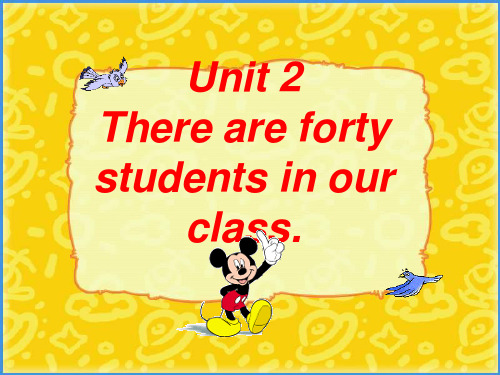
Us in our
class.
Lesson 8
New words
Thirty
30
Forty
40
Fifty
50
Let’s learn
How many students are there in your class?
40
They are forty.
Boy
Twenty-one
21
Twenty-two
22
Twentythree
23
Twenty-four
24
Twenty-five
25
Twenty-six
26
Twentyseven
27
Twenty-eight
28
Twenty-nine
29
Let’s practic
e!
How many students
Twenty-one
Twenty-two
Twenty-three
Twenty-four
Twenty-five
Twenty-six
Twenty-seven Twenty-eight Twenty-nine
Summary
句型:How many… 表示询问数量 译 为:…… 有多少?
二十以上的数量词表达:先表达twenty 然后按照 数量词的基本表达接续。
Twenty-one two three four five six seven eight nine
Unit 2
There are forty students in our class
Lesson 7
Revie w
还记得这些数字用英文怎么表达 吗?
class.
Lesson 8
New words
Thirty
30
Forty
40
Fifty
50
Let’s learn
How many students are there in your class?
40
They are forty.
Boy
Twenty-one
21
Twenty-two
22
Twentythree
23
Twenty-four
24
Twenty-five
25
Twenty-six
26
Twentyseven
27
Twenty-eight
28
Twenty-nine
29
Let’s practic
e!
How many students
Twenty-one
Twenty-two
Twenty-three
Twenty-four
Twenty-five
Twenty-six
Twenty-seven Twenty-eight Twenty-nine
Summary
句型:How many… 表示询问数量 译 为:…… 有多少?
二十以上的数量词表达:先表达twenty 然后按照 数量词的基本表达接续。
Twenty-one two three four five six seven eight nine
Unit 2
There are forty students in our class
Lesson 7
Revie w
还记得这些数字用英文怎么表达 吗?
Power Up4精品课件-Unit 5 Let it snow Lesson 8

Invent the answers.
How old? What clothes? Slow/fast? What time? Teaize?
How old is Emma?
She is nine.
Let’s review.---抢答
01
Answer questions about Emma.
She likes / Her favourite winter sport is sledging.
She goes sledging on/in the hills. she goes (sledging) with her friends.
He wanted to go snowboarding..
01 Group work.---act out your TV weather report
Summary.
What do we learn today?
Homework.
1.Review the key words and key structures in this Unit.
Make questions for the answers about Robert’s winter sport.
1 What's Robert's favourite winter sport? 2 Where does he do it? 3 Who does he go (skiing)with? 4 Does he go (skiing) in the morning or (in) theafternoon? 5 How long does he ski for?
01
All about me.
